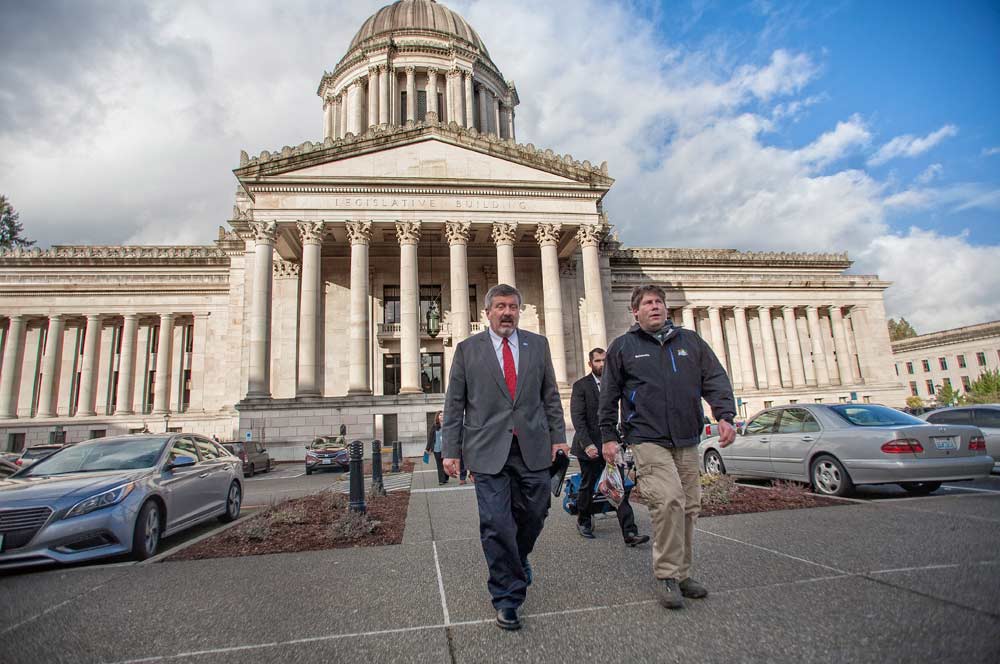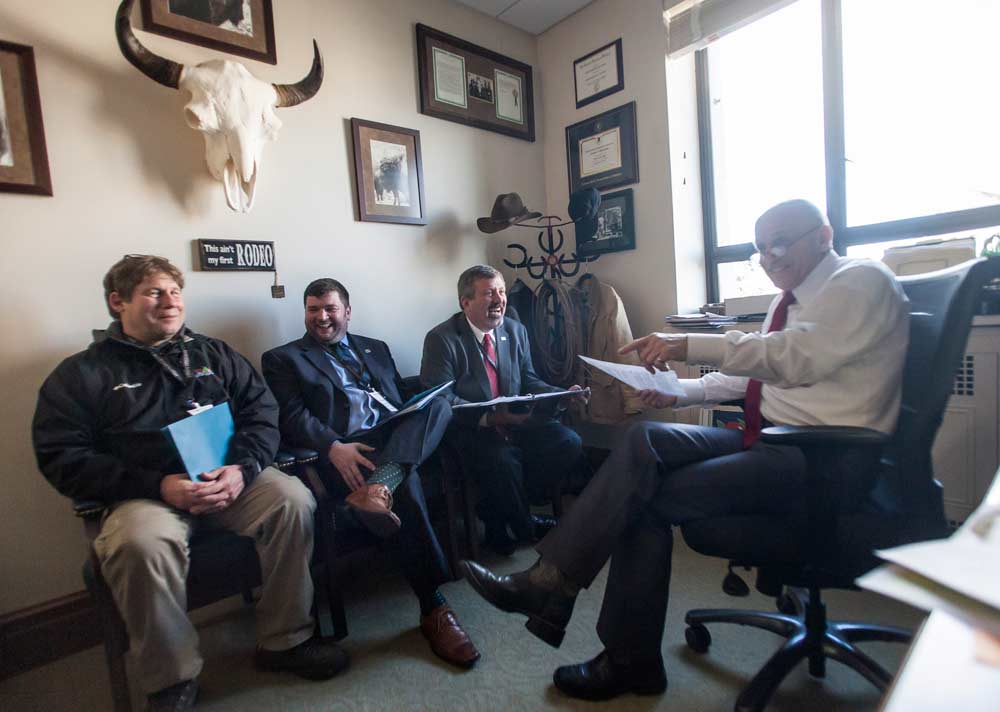
Jim Colbert, left, and grower Mark Hanrahan walk from meeting to meeting in January at the annual Tree Fruit Day in Olympia, Washington. Each year toward the beginning of the legislative session, industry officials take growers to the State Capitol to bend the ear of lawmakers and agency administrators about the tree fruit industry’s concerns. Colbert is the director of business relations for Chelan Fresh and a small-acreage grower in Chelan, Washington. Hanrahan is a mid-sized grower in Zillah, Washington. (Ross Courtney/Good Fruit Grower)
The answer is no. You don’t have to wear a tie.
That’s one of the most common questions Jon DeVaney, president of the Washington State Tree Fruit Association, gets each year when he urges growers to attend the annual Tree Fruit Day at the state Capitol.
Try to clean up, but you may dress as you wish if you join a lobbying visit to state or federal lawmakers to tell them directly what the fruit industry needs, whether in Olympia, Albany, New York or D.C. Some growers don coats and ties, others open collars with khakis.
Mark Hanrahan, a Zillah, Washington, midsize grower, sported cargo jeans and a hoodie on the annual trip in late January. His wife gave him a hard time, but his attire didn’t bother legislators.
The point is that policy makers listen more attentively to growers themselves compared to association staff members or paid lobbyists.
“It’s important for them to hear the story coming from someone who actually, really has to comply with everything they’re doing,” said Jeff Pheasant, a Soap Lake, Washington, grower. “I’m the one who will have to pay the fines.”
Even the paid lobbyists agree.
“It can’t be overstated the importance of real people being here,” said Jim Halstrom, an unreal person — that is, one of the Washington apple industry’s two paid lobbyists. (He does wear a tie.)

From left, Mark Hanrahan, Tim Kovis and Jim Colbert visit with Washington Rep. Tom Dent, R-Moses Lake, to discuss the concerns of the tree fruit industry. Hanrahan is a mid-sized grower from Zillah, Washington. Kovis is the communications manager of the Washington State Tree Fruit Association, a Yakima, Washington, organization that lobbies at the state level on behalf of the fruit industry. Colbert is a small grower and the director of business relations for Chelan Fruit. (Ross Courtney/Good Fruit Grower)
Tree Fruit Day 2018
Here’s what January’s Tree Fruit Day looked like.
DeVaney organized a block of hotel rooms and hosted a dinner the night before at a seafood restaurant overlooking Budd Inlet. Senior administrators for the state Department of Agriculture attended. His staff delivered gift boxes earlier in the day.
The next morning began with a shuttle ride up Capitol Way to a lobbyist’s home just off campus nicknamed The Castle after its architecture. The growers split into groups, each led by a staff member or board member, and reviewed bios of the legislators they would visit in prearranged meetings. They also rehearsed their topics, using a white paper full of “talking points.” Nobody was turned loose without a plan.
DeVaney also shared a few instructions for the whole contingent.
One: Avoid grumbling until well out of earshot. Gossip spreads quickly. “Legislature is a lot like high school,” he warned.
Then, the groups spread out across the campus under a rare blue sky to make their sales pitch 15 minutes at a time. Most legislators simply listened politely.
Some asked challenging questions, but some admitted they agreed on certain topics. For example, apple growers are pushing back against a proposed state bill that would have required four days’ notice before spraying.
“Oh yeah, that’s stupid,” said Longview Democratic Sen. Dean Takko, who represents a coastal district with logging and shellfish industries that share some of the same environmental regulatory concerns as fruit growers. The proposal has been drastically softened since then.
Later in the day, Jim Colbert, director of business relations for Chelan Fruit and chairman of the Tree Fruit Association, told Rep. Paul Graves, a Republican from a rural community east of Seattle, that the apple industry generates oxygen as a tongue-in-cheek argument against a carbon tax proposed by Democratic Gov. Jay Inslee.
“That’s funny; I like that idea,” said Graves, who also opposes the tax.
In the hallways, the growers all rubbed shoulders with groups representing other industries doing the exact same thing — state patrolmen, teachers, tourism officials. The Washington Potato Commission hosted a baked potato bar right on the marble steps of the Capitol Rotunda. Some years, the fruit industry’s visit coincides with the dairy producers, which means free ice cream.
Elsewhere in the country
Industry organizations in other states hold similar events.
Toward the end of February or early March, the New York Apple Association takes a group of growers to Albany, New York, to meet with lawmakers. Usually, they are board members who hold a meeting at the same time, said Cynthia Haskins, president of the New York Apple Association.
The U.S. Apple Association does the same thing on a national scale, said Diane Kurrle, senior vice-president.
Every March, growers visit Capitol Hill in Washington D.C., a day full of prearranged meetings with similar talking points laid out on paper. Some are board members gathering for a semiannual meeting, but other growers — especially from the East — just join in on their own. Usually a dozen states participate, including Washington, which arranges its own meetings through the Northwest Horticultural Council, Kurrle said.
Real growers help crystalize the industry’s arguments. Kurrle can speak generally about labor, trade and the proposed Farm Bill, but growers can tell lawmakers why those things matter so much. “They can give all of those very specific arguments,” she said.
She also suggests growers not wait for an organized event. Drop in on lawmakers’ district offices or approach them politely in the grocery store. They need, and usually want, to hear from their constituents. “That’s actually helpful; you’re not bothering them.”
And though she doesn’t suggest a dress code, she has one request: Leave knives at home. In the past, growers used to carrying a blade around in their pocket have had to stash them in the bushes until the day ended. •
—by Ross Courtney






Leave A Comment